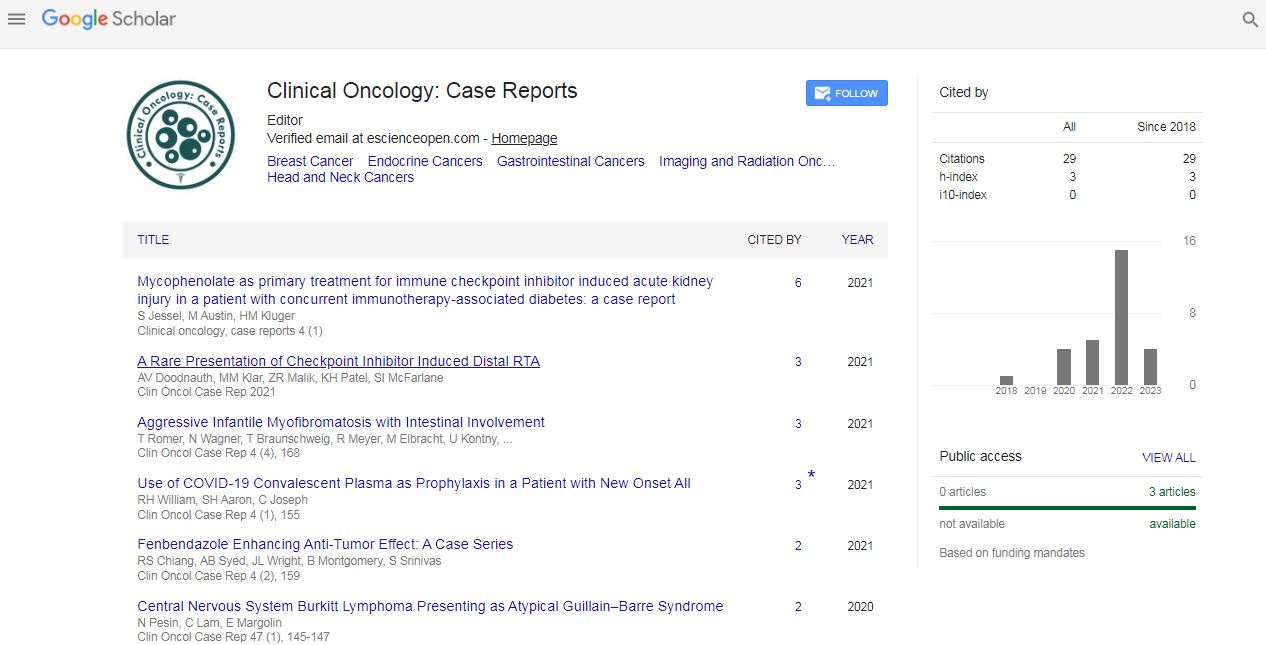Case Report, Clin Oncol Case Rep Vol: 5 Issue: 7
Liver Venous Deprivation for Rapid Liver Hypertrophy before major Hepatectomy: A Case Report
Nathan John1, Lisandro Montorfano1, Arun Nagarajan2, Conrad Simpfendorfer1, Parag Amin3 , Mayank Roy1*
1Department of General Surgery, Section of Hepatobiliary and Pancreatic Surgery,Cleveland Clinic Florida, Weston, Florida, USA
2Department of Hematology and Medical Oncology, Cleveland Clinic Florida, Weston,Florida, USA
3Department of Imaging, Section of Interventional Radiology, Cleveland Clinic Florida, Weston, Florida, USA
*Corresponding Author: Mayank Roy
Department of General Surgery, 2950 Cleveland Clinic Florida, Weston, Florida, 33326, USA
E-mail: roym@ccf.org
Received: July 12, 2022; Manuscript No: COCR-22-69088;
Editor Assigned: July 14, 2022; PreQC Id: COCR-22-69088 (PQ);
Reviewed: July 25, 2022; QC No: COCR-22-69088 (Q);
Revised: July 26, 2022; Manuscript No: COCR-22-69088 (R);
Published: July 31, 2022; DOI: 10.4172/cocr.5(7).241
Citation: John N, et al. (2022) Liver Venous Deprivation for Rapid Liver Hypertrophy before Major Hepatectomy: A Case Report. Clin Oncol Case Rep 5:7
Abstract
Liver Venous Deprivation (LVD) is an emerging minimally invasive strategy to induce rapid liver hypertrophy of the Future Liver Remnant (FLR) before a major hepatectomy. LVD (aka “double vein embolization”) entails same-session percutaneous embolization of the portal and hepatic veins of the planned liver resection. This report discusses the utilization and technical challenges of LVD in managing of a 49-year-old male with recurrent multifocal Colorectal Liver Metastases (CRLM). The patient initially underwent neoadjuvant FOLFOX chemotherapy followed by a simultaneous laparoscopic sigmoid colectomy and liver surgery (microwave ablation of segment 5th, and wedge resections of segment 1st and 4thb), followed by completion of chemotherapy. The patient had a R0 resection with clear colon and liver surgical margins. Nine months after the initial surgery, the patient had a rise in tumor markers, and surveillance imaging demonstrated recurrence of liver metastases in segments 1st and 5th. LVD was performed by interventional radiology, which led to 28% increase in FLR (segments 2nd, 3rd, and 4th); initially measuring 464 cm3 prior to LVD and measuring 594 cm3 by post-procedure day 21. The patient underwent right hemi-hepatectomy and caudate resection on post-procedure day 29. The patient did not have any complication and discharged on postoperative day six. The patient remains disease-free with no evidence of recurrence at twelve months follow up.
 Spanish
Spanish  Chinese
Chinese  Russian
Russian  German
German  French
French  Japanese
Japanese  Portuguese
Portuguese  Hindi
Hindi 